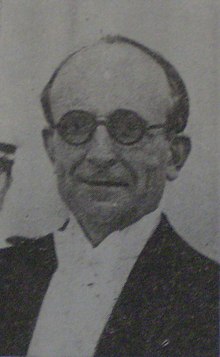Salvador Madariaga
| Salvador de Madariaga | |
|---|---|
 |
|
| Born | 23 July 1886 A Coruña |
| Died | 14 December 1978 Muralto |
| Occupation |
Historian, opinion journalist, literary critic, university teacher |
| Awards |
Charlemagne Prize |
Salvador de Madariaga y Rojo (23 July 1886 in A Coruña, Spain – 14 December 1978 in Locarno, Switzerland) was a Spanish diplomat, writer, historian and pacifist. He was nominated for the Nobel Prize in Literature, and the Nobel Peace Prize.
He graduated with a degree in engineering in Paris, France before gaining a Masters of Arts at Oxford University in the United Kingdom. He then went to work as an engineer for the Northern Spanish Railway Company but abandoned this work to return to London and become a journalist, writing in English, for The Times. At this time he began publishing his first essays. In 1921 he became a press member of the Secretariat of the League of Nations and became chief of the Disarmament Section in 1922. In 1928, he became Professor of Spanish at Oxford University for three years, during which time he wrote a book on nation psychology called Englishmen, Frenchmen, Spaniards.
In 1931 he was appointed ambassador to the United States of America and a permanent delegate to the League of Nations, a post he kept for 5 years; chairing the Council of the League of Nations in January 1932, he condemned Japanese aggression in Manchuria in such vehement terms that he was nicknamed "Don Quijote de la Manchuria". Between 1932 and 1934 he was Ambassador to France. In 1933 he was elected to the National Congress, serving as both Minister for Education and Minister for Justice. In July 1936, as a classic liberal he went into exile in England to escape the eruption of the Spanish civil war. From there he became a vocal opponent of, and organised resistance to, the dictatorship of General Francisco Franco. In 1947, he was one of the principal authors of the Oxford Manifesto on liberalism. He participated in the Hague Congress in 1948 as president of the Cultural Commission and he was one of the co-founders, in 1949, of the College of Europe.
...
Wikipedia
